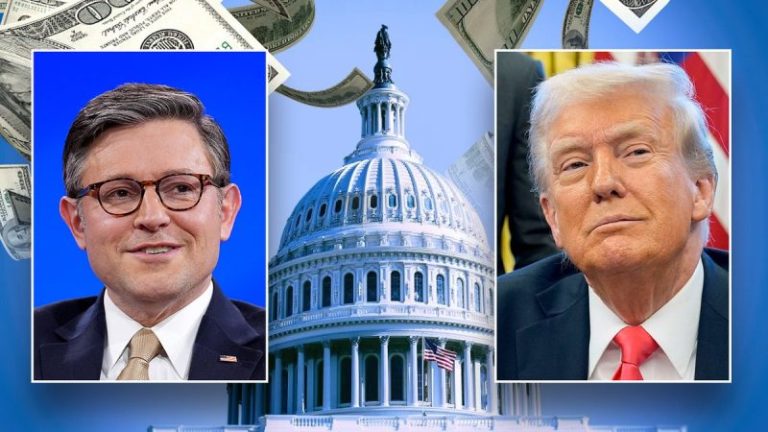The fate of President Donald Trump’s $9.4 billion spending cuts request could rest on the shoulders of a handful of moderate House Republicans.
The House of Representatives is set to consider the measure on Thursday afternoon, which cuts $8.3 billion in funds to the U.S. Agency for International Development (USAID) and just over $1 billion from the Corporation for Public Broadcasting, which routes federal funds to NPR and PBS.
But at least four GOP lawmakers are known to have expressed some concerns about various aspects of the package.
House Republican leaders have a razor-thin, three-seat majority in the chamber, which means any dissent beyond that could sink the bill.
None of the four Republicans – Reps. Mark Amodei, R-Nev., David Valadao, R-Calif., Nicole Malliotakis, R-N.Y., and Don Bacon, R-Neb. – have said how they will vote on the bill, however. They also all approved a procedural vote to allow for debate on the measure.
But Amodei, co-chair of the Public Broadcasting Caucus, told Fox News Digital on Wednesday afternoon that he was not worried about NPR and PBS’ national brands, with which he acknowledged the GOP’s bias concerns, and that his fear was gutting funding to smaller local outlets that rely on federal funding to keep people informed in areas with less access.
‘These aren’t the people that are doing editorial boards that are flipping you the bird,’ Amodei argued to his fellow Republicans. ‘They’re kind of important pieces of infrastructure in their communities.’
Amodei, who is intimately familiar with the government funding process as a House appropriator, said ‘a whole bunch of red counties’ depend on public broadcast funding.
‘It’s easier for the nationals to raise money if they’ve got to make up for some funding they lost than it is these guys,’ he said.
Valadao, who represents a California swing district, told Politico he was not sure if the measure would pass.
He declined to elaborate on his concerns to Fox News Digital, however, and his office did not respond to a request for clarification.
Meanwhile, Malliotakis told reporters on Wednesday that she met with Republican voters in her district who wanted PBS funding preserved – but that her real concern was the process.
‘I think that there’s a lot of questions that members have regarding what programs specifically are going to be cut. This is a broad look at general accounts. We are, at the end of the day, the Congress that holds the power of the purse. We’re the ones who we’re supposed to be identifying where funding is going. And this gives a lot of discretion to the White House to be doing that unilaterally without Congress,’ Malliotakis said.
‘I think there’s a large number of members that do have concerns about that. And whether members are going to vote yes or no is a different story in this place. But I have, certainly, reservations… and we’ll see how things go.’
Bacon, one of three House Republicans representing a district that former Vice President Kamala Harris won in 2024, told reporters Tuesday morning that he was feeling better about the legislation after getting assurances that the foreign aid cuts would not gut money for critical medical research.
He did not say whether his earlier concerns about PBS and NPR were alleviated, however, nor did he say how he would vote on the bill.
Bacon told reporters last week, ‘It does bother me, because I have a great rapport with Nebraska Public Radio and TV.’
When reached for comment, his office pointed Fox News Digital to Bacon’s Wednesday morning appearance on C-SPAN.
‘I think the president has to work with us and make this better. So I’m in opposition. That said, I’m in current negotiations with the leadership on this as well,’ Bacon said.
The $9.4 billion proposal is called a rescissions package, a mechanism for the White House to block congressionally approved funding it disagrees with.
Once transmitted to Capitol Hill, lawmakers have 45 days to approve the rescissions proposal, otherwise it is considered rejected.
Such measures only need a simple majority in the House and Senate to pass. But that’s no easy feat with Republicans’ thin majorities in both chambers.
If passed, Republican leaders hope the bill will be the first of several rescissions packages codifying spending cuts identified by Elon Musk’s Department of Government Efficiency (DOGE).
Musk set out with a goal of finding $2 trillion in federal waste, but wound up identifying about $180 billion.
House GOP leaders lauded the proposal during their weekly press conference on Tuesday.
‘These are commonsense cuts. And I think every member of this body should support it. It’s a critical step in restoring fiscal sanity and beginning to turn the tides and removing fraud, waste, and abuse from our government,’ Speaker Mike Johnson, R-La., said.

